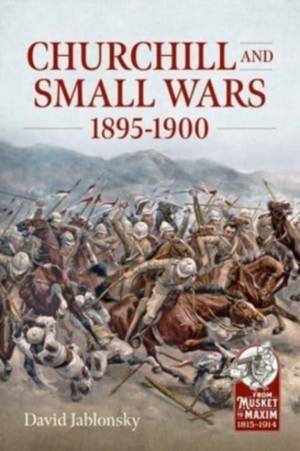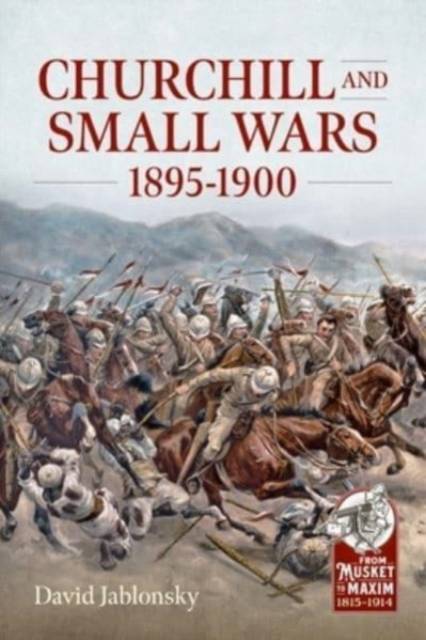
- Retrait gratuit dans votre magasin Club
- 7.000.000 titres dans notre catalogue
- Payer en toute sécurité
- Toujours un magasin près de chez vous
- Retrait gratuit dans votre magasin Club
- 7.000.0000 titres dans notre catalogue
- Payer en toute sécurité
- Toujours un magasin près de chez vous
Description
The term 'small wars' is synonymous with Charles E. Callwell's famous publication of that name. It is most closely linked with the conflicts of the late 19th century, and in particular those concerning the British Empire. This new work by David Jablonsky looks at several of the wars that could justifiably be classed as 'small wars'. In doing so it witnesses and examines them through the eyes of a young army officer and journalist whose name would later become known throughout the world. At this stage Winston Churchill was a young man making his way as both a journalist and Army officer.
The journey starts with a visit to Cuba during the Spanish-American War where Churchill traveled with the Spanish Army commanded by General Juarez Valdez. He then served in India, accompanying the Malakand Field Force, the story of which provided the basis for his first book. Following that he was in the Sudan, where he witnessed an unusual kind of 'small war', and took part in the 'celebrated' charge of the 21st Lancers. The outcome of this was his second book, The River War, which gives an interesting insight into this 'small war'. Jablonsky then looks at the conflict that perhaps is at the very limit of what could be called a 'small war' The South African War, or Second Anglo-Boer War.
In all such conflicts Churchill combined his military activity with that of journalism, thus leaving a detailed account and giving a unique perspective of such conflicts. This was a man who rode with the Spanish in Cuba, fought on the Northwest Frontier, charged with the 21st Lancers in the Sudan, made a successful escape from a Boer prisoner of war camp and a run to freedom, and recorded all his events for publication. His conduct might appear strange to a modern reader, as we do not expect journalists to take part in the fighting, but it was not uncommon for the era, and as his life and experiences show, Churchill was far from ordinary. Indeed, this work highlights a largely forgotten period of a remarkable man, and by so doing sheds light on the conduct of the 'small wars' of empire.
The journey starts with a visit to Cuba during the Spanish-American War where Churchill traveled with the Spanish Army commanded by General Juarez Valdez. He then served in India, accompanying the Malakand Field Force, the story of which provided the basis for his first book. Following that he was in the Sudan, where he witnessed an unusual kind of 'small war', and took part in the 'celebrated' charge of the 21st Lancers. The outcome of this was his second book, The River War, which gives an interesting insight into this 'small war'. Jablonsky then looks at the conflict that perhaps is at the very limit of what could be called a 'small war' The South African War, or Second Anglo-Boer War.
In all such conflicts Churchill combined his military activity with that of journalism, thus leaving a detailed account and giving a unique perspective of such conflicts. This was a man who rode with the Spanish in Cuba, fought on the Northwest Frontier, charged with the 21st Lancers in the Sudan, made a successful escape from a Boer prisoner of war camp and a run to freedom, and recorded all his events for publication. His conduct might appear strange to a modern reader, as we do not expect journalists to take part in the fighting, but it was not uncommon for the era, and as his life and experiences show, Churchill was far from ordinary. Indeed, this work highlights a largely forgotten period of a remarkable man, and by so doing sheds light on the conduct of the 'small wars' of empire.
Spécifications
Parties prenantes
- Auteur(s) :
- Editeur:
Contenu
- Nombre de pages :
- 224
- Langue:
- Anglais
- Collection :
Caractéristiques
- EAN:
- 9781804511824
- Date de parution :
- 31-10-25
- Format:
- Livre broché
- Format numérique:
- Trade paperback (VS)
- Dimensions :
- 155 mm x 234 mm

Les avis
Nous publions uniquement les avis qui respectent les conditions requises. Consultez nos conditions pour les avis.






